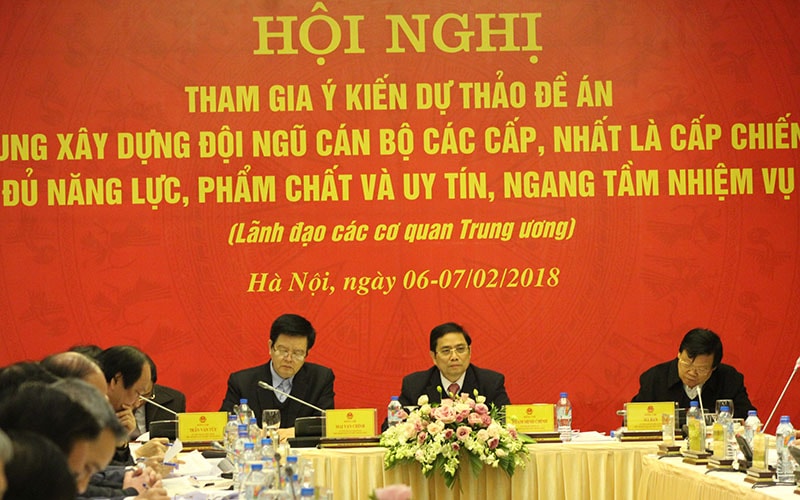Head of the Central Organizing Committee: I have an incurable disease of 'loving flattery'
Head of the Central Organizing Committee Pham Minh Chinh reiterated the opinions of many provincial party secretaries pointing out the situation: "We are suffering from the incurable disease of 'loving flattery'. Self-criticism, criticism, and flattery are mainly flattery, so our comrades do not know their shortcomings."
This morning, the Central Organizing Committee held a conference to give opinions on the draft project focusing on building a team of cadres at all levels, especially at the strategic level, with sufficient capacity, qualities and prestige, equal to the task.
|
| Head of the Central Organizing Committee Pham Minh Chinh |
Choose a good leader, the whole system is good
Mr. Pham Minh Chinh said that in the new situation affecting the work of cadres, cadres must also innovate. Of particular concern are the leading and managing cadres, especially the strategic-level cadres under the management of the Politburo and the Secretariat (cadres from deputy ministers, ministers and equivalent and above). Therefore, the project of the Central Organization Committee delimits these two groups of cadres, emphasizing the role of the leader.
“We choose a team of cadres, especially at the strategic level of the Politburo and Secretariat, if we manage well, if we choose a good leader, the whole system will be good. A good leader will choose a good deputy, a bad leader will find it difficult to choose a good deputy, then everything will be different,” he emphasized.
In parallel with this project, since the beginning of the term, there have been two other projects included in the six key tasks. The project approved at the 4th Central Committee on Party building and rectification is currently making good progress. The second project approved at the 6th Central Committee on building a streamlined, effective and efficient political system that ministries, branches and localities are vigorously implementing.
According to him, current regular expenditures account for 65% of the budget, while development investment expenditures are gradually decreasing while development investment is needed, so we have to borrow. If this is not resolved, the upcoming 7th Central Committee will not know where to get the source to pay salaries when discussing salary reform.
Thus, during this term, along with building and rectifying the Party, building a streamlined, effective and efficient apparatus, the 7th Central Committee will discuss building a team of cadres.
There are two focuses in personnel work: Strongly innovating personnel work (including 7 stages) and building a team of strategic-level cadres and leaders at all levels.
“Having a good, excellent team will change the situation. To have this team, we must have good personnel work,” he said.
The provincial party secretary must be from another locality.
Talking about solutions, the Head of the Central Organizing Committee focused on some breakthrough contents. First, discovering, training and fostering talents. Next is evaluating cadres. According to Mr. Pham Minh Chinh, this is a weak link. Incorrect evaluation and wrong arrangement are normal.
"We propose a multi-dimensional, 360-degree evaluation, from above, below, from below, from inside, from outside; continuous evaluation every week, month, 3 months, 6 months, quantifying the evaluation. For example, what are the products of a provincial party secretary or minister? What are the products in the first year, what are the products in the second year, and whether there are any products after 5 years," said the Head of the Central Organizing Committee.
He also noted that the assessment of cadres by collecting information, such as China, established 45 teams to go to 28 provinces and 140 agencies. This team is headed by the Chinese General Secretary and established 45 sub-teams headed by ministers, members of the Politburo, and the Secretariat to conduct the assessment.
“Recently, the Central Organizing Committee has worked with some places by having the Deputy Head of the Committee go down to meet each member of the Standing Committee, the Executive Committee, and related comrades to grasp the situation. Then, when they come back, they will give comments to the Standing Committee on things that belong to the Standing Committee, and comments to the Secretary on things that belong to the Secretary, but hide the source for criticism and self-criticism, which is not noisy, complicated, but effective,” he cited.
He also pointed out the reality through the words of many provincial party secretaries who said: "We are suffering from an incurable disease of liking flattery. Review, criticism, and self-criticism are mainly flattery, so our comrades do not know their shortcomings."
The third breakthrough solution, according to Mr. Pham Minh Chinh, is to control power, filter, classify, and replace (liquidate). "Currently, we have not controlled power well, so we use it incorrectly, seeing power as our own and then giving it away or asking for it." According to him, this is a complicated, sensitive task that has not been done yet.
At previous conferences, the provincial party secretaries were highly unanimous that the provincial party secretary must not be a local person. He analyzed: “Through the handling of recent cases, it has been shown that the provincial party secretary who is a local person has the advantage of understanding the local situation and traditions, but the disadvantage is that there are many constraints. How is my child, how is my grandchild, and how is my classmate when I ask for help?”

